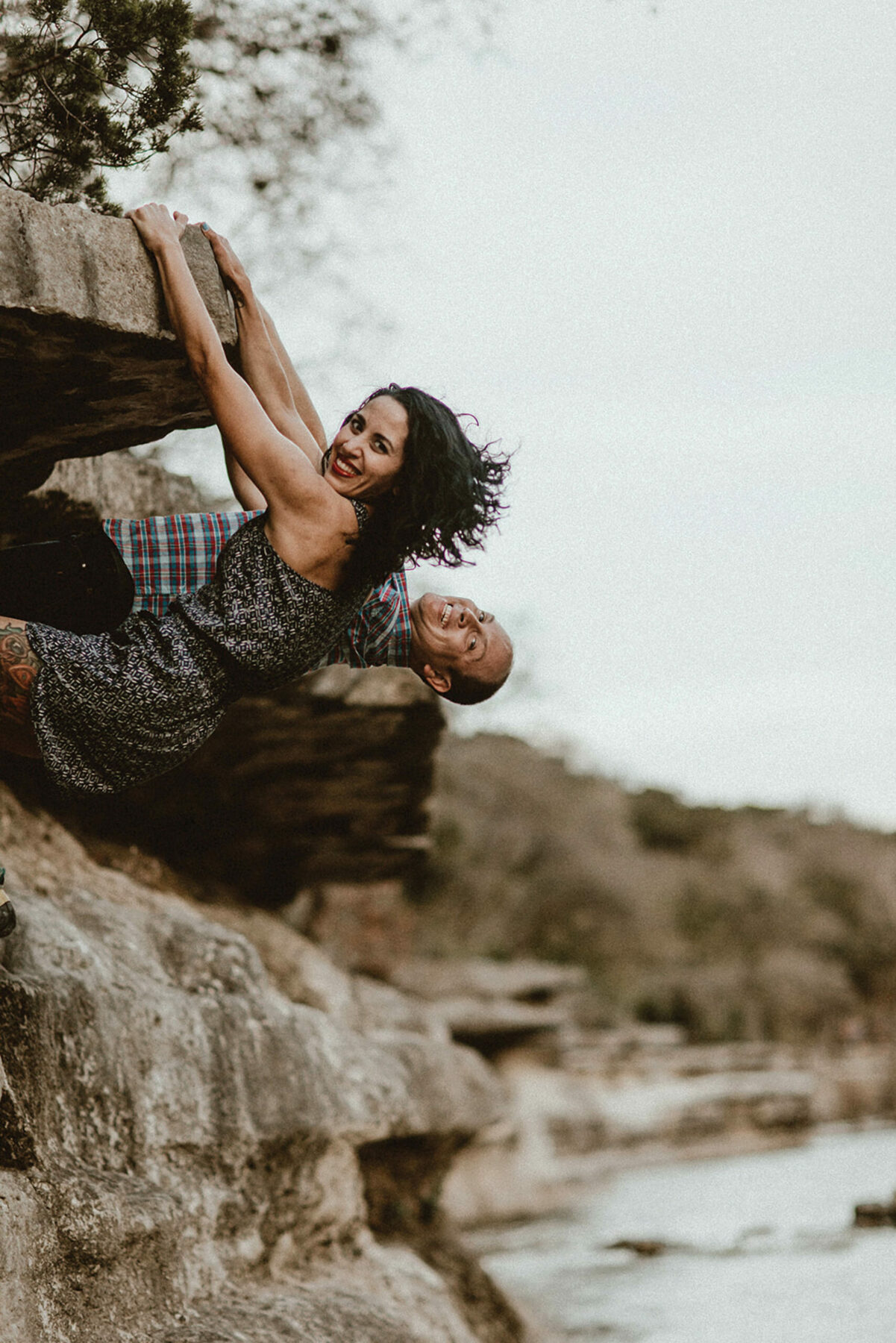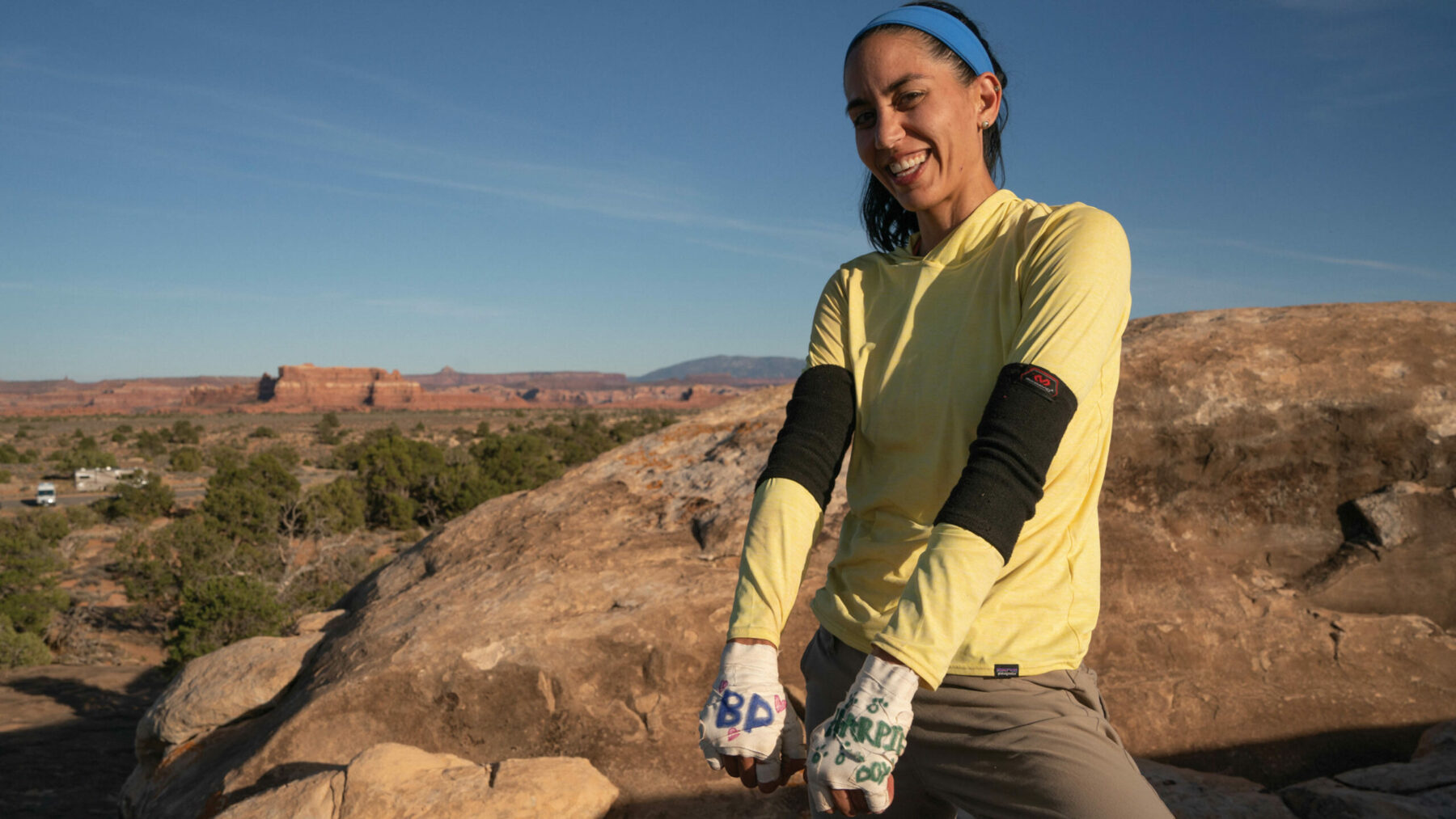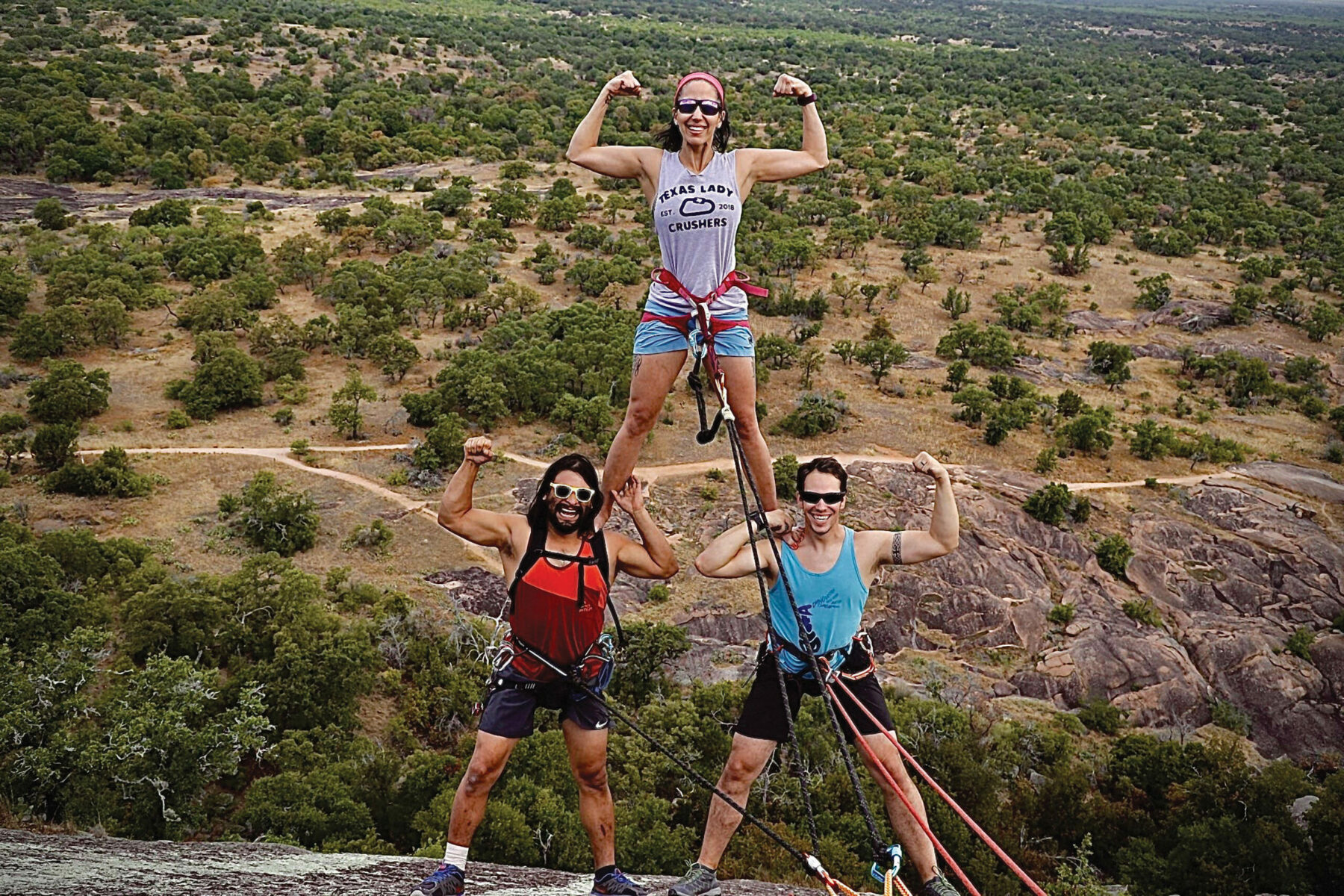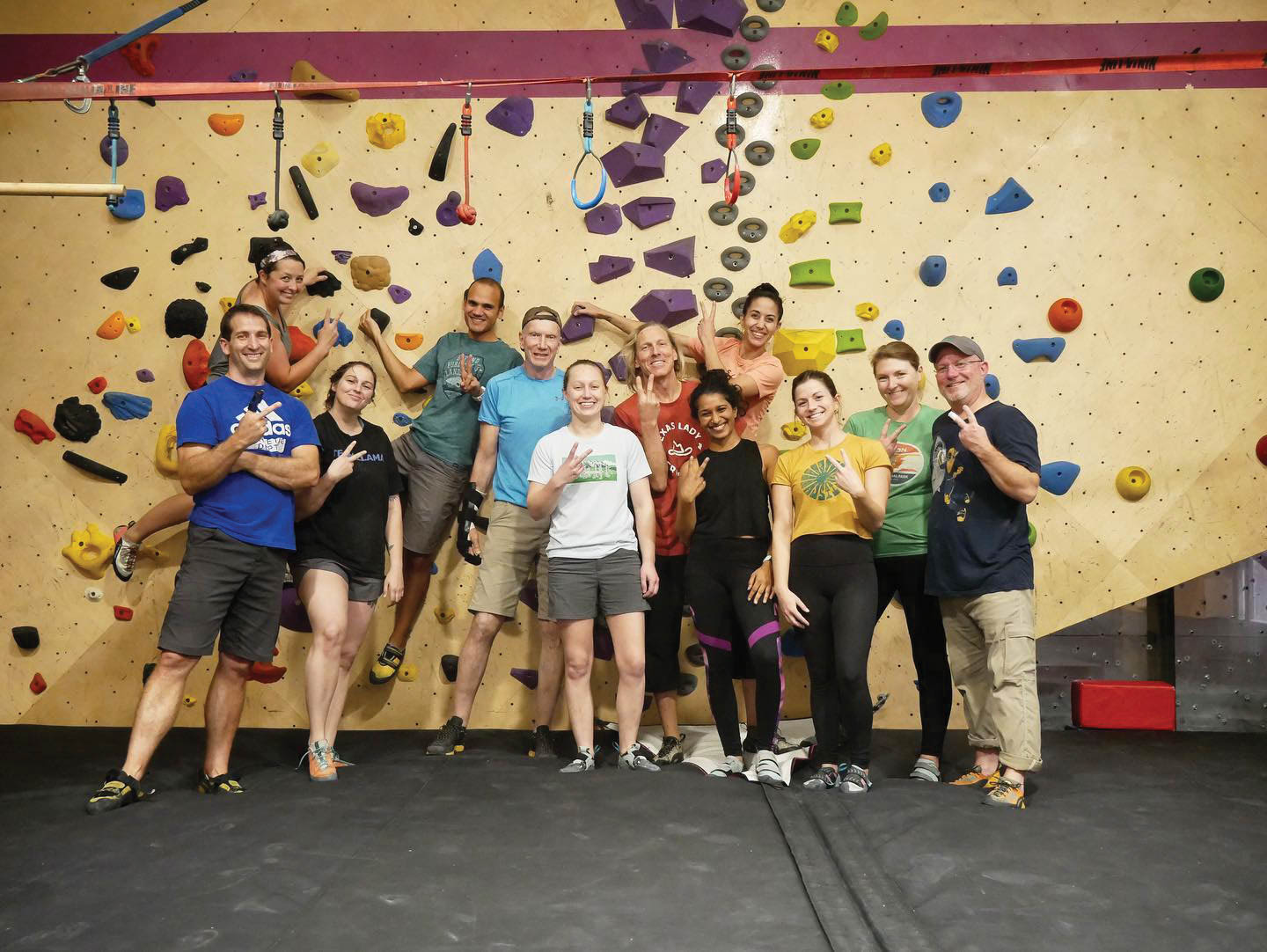The Story Behind Texas Lady Crushers

Emilie Hernandez has always loved rock climbing, but her past climbing experiences were far from perfect when it came to inclusivity. When she started climbing at 23 years old, Hernandez often went climbing with men. Although she enjoyed the outings, Hernandez always felt out of place with the men she climbed with. She says that toxic masculinity caused her to become insecure in her climbing abilities, leaving her fearful to ask questions.
In December of 2017, Hernandez hosted a women’s climbing event in Dripping Springs and spoke to women climbers who had similar experiences. Hernandez realized she wasn’t the only one who felt this way about the climbing community in Texas.
“I kept hearing about these women being put on very challenging rock climbing routes and just like me, they thought that was the only kind of rock climbing that exists,” Hernandez says. “It makes you think it’s too scary and that you can’t do it, but you can’t show that you’re scared so you just pretend that you’re not and don’t ask questions.”

Photography credit to Savannah Cummins
Hearing these anecdotes from women climbers triggered Hernandez’s own trauma and ignited the flame that made her want to start Texas Lady Crushers (TxLC). In 2018, the rock climbing group was born and now dedicates itself to supporting and educating women, nonbinary and trans-identifying community members in their journey to becoming confident climbers.
Though her passion drove her, she didn’t have much experience in organizing a group like this, as Hernandez was a chef for seven years prior to starting TxLC.
“For the first two years, it was all free; I never charged a penny or encouraged donations,” Hernandez says. “At the time, I wasn’t a guide and I didn’t really know about guiding companies so I just called them ‘meetups.’ If it was at a gym, they would pay the gym fee; if it was at a park, they would pay the park fee; we would just come out and climb.”

Photography credit to Morgan Sessions
Hernandez’s meetups were thriving but once COVID-19 hit, things began to change. As her group started gaining traction with increasingly more climbers attending events, she had to start charging for guided climbing events to keep tabs on who was coming and remain COVID-conscious. With their numbers per climb reaching about 25 people, Hernandez used the Facebook group to find people who were willing to help facilitate the climbs.
Since then, TxLC has continued to grow, and Hernandez started working with other guiding companies to help her manage her clientele. Hernandez didn’t want to lose sight of her mission as TxLC grew, so she implemented measures to ensure everyone felt safe and was having fun.
“I start every meetup introducing myself and giving information (on) what we are about to do. I like to emphasize our principles of respect and remind them it’s OK to ask questions or come to me with concerns,” Hernandez says. “I can read people really well, and I understand how loudly nonverbals speak, so I always have a follow-up questionnaire to make sure I didn’t miss anything.”
Hernandez’s dedication and willingness to cater to individual needs haven’t gone unnoticed. Mandy Mendez attended her first TxLC meetup in December of 2019 and hasn’t looked back since. She loves TxLC so much that she now serves as their Chief Marketing Officer.
Unlike Hernandez, Mendez didn’t start climbing until later in life; but once she did, she found a passion that never left. When Mendez started climbing, she had never climbed outdoors, unless it was with her husband. For the first six months of her outdoor climbing journey, she only climbed with men.

Photography credit to Hannah Zamora
After her husband sent her a flier for TxLC, she attended the event in an attempt to make new friends. That day changed the way she viewed climbing forever.
“I went out there on my own and was a little nervous, but when I came back and talked to my husband about it, he could tell I had a blast,” Mendez adds. “It’s a different world to climb with women. When you’re with the Lady Crushers, there’s a genuine positivity and you want to see everyone succeed — you can let your guard down a little bit.”
On the other hand, Erin Wackerla is a bit newer to the TxLC but has still found a great sense of purpose and community within the group. Wackerla has struggled with alcohol misuse in the past, and climbing has served as an escape for her.

Photo courtesy of Emilie Hernandez
In addition to working for a national sober active community called The Phoenix, Wackerla has been an active TxLC member since she first went on a group climb.
“When I was younger and partying, I was still searching for my sense of self. Even though I loved climbing, I didn’t take the initiative to learn how to do it properly,” Wackerla says. “With Emilie and TxLC, I feel safe to ask questions (knowing) I won’t be discriminated against and will be respected instead of doubted. It’s empowering to feel like you’re going to be heard and listened to.”
In addition to providing an inclusive space for all gender identities, TxLC also understands that not everyone can afford their own climbing equipment. Even if you’ve never used climbing gear before, TxLC will provide gear for the climb and show you how to use it.
TxLC offers climbing meetups as well as guided climbing clinics. While the meetups are more relaxed in nature, the guided clinics are intensive sessions catering to a specific type of climber and can include lead and crack climbing.

Photo courtesy of Emilie Hernandez
Some of the Lady Crushers’ climbing sites include Monster Rock, Enchanted Rock and Barton Creek Greenbelt. Although TxLC has visited many sites in Austin and Central Texas, Hernandez still hopes to uncover new spots.
“We are always looking for new places to climb,” Hernandez says. “But since 95% of Texas is privately owned, that can be difficult.”
Hernandez shares that if any landowners are willing to open their space for rock climbing, TxLC aims to dedicate its time to keeping the space clean.
For rock climbers or people interested in bouldering who feel a little lost, TxLC aims to help you on your journey to becoming an avid climber. Throughout her experience climbing, Wackerla has learned that anyone can do anything they want if they put their mind to it.
“Climbing reminds me I can do hard things,” Wackerla says. “When I have self-doubt and social anxiety, I have the same butterflies in my stomach as when I’m about to go on a scary climb. I remind myself that I’ve felt this before, and I can do hard things.”






